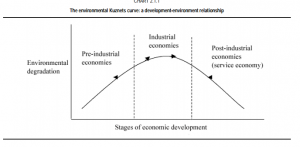Before transcribing any passages, I would first like to direct your attention to the environmental Kuznets curve:
For those who are not familiar, this is essentially a hypothesis that as per capita income increases for the first time, environmental degradation also increases. Per capita income will then hit a turning point (most studies put that at about $8000/yr) where society will decide that they want a cleaner environment and will begin to allocate money to be more environmentally conscious and friendly. Notice how this is almost the exact same thing as the biblical narrative of (1) fall, (2) desert, (3) garden?
“Using science, technology, and biblical imagery, they changed first the easter wilderness and then the western deserts into cultivated gardens. Sanctioned by the Genesis origin story, they subdued the “wilderness,” replenished the earth, and appropriated Indian homelands as free lands for settlement. Mercantile capitalism cast America as the site of natural resources, Africa as the source of enslaved labor, and Europe as the locale of resource management” (140).
“The narrative of frontier expansion is a story of male energy subduing female nature, taming the wild, plowing the land, re-creating the garden lost by Eve. American males lived the frontier myth in their everyday lives, making the land safe for capitalism and commodity production, Once tamed by men, the land was safe for women. To civilize was to bring the land out of a state of savagery and barbarism into a state of refinement and enlightenment. This state of domestication, of civility, is symbolized by woman and “womanlike” man” (147).

